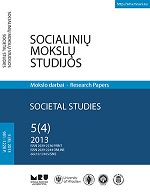Tautos samprata – paradigmų kaita
The Concept of the Nation – The Shift of Paradigms
Author(s): Bronislovas KuzmickasSubject(s): Social Sciences
Published by: Mykolas Romeris University
Keywords: nation; state; history; tradition; creation
Summary/Abstract: The article deals with the problem of the paradigmatic changes of the concept of nation, which was going on in the period from the end of the 18th and 19th centuries up to the present time. The ideas of German Romanticism and philosophy as well as those of French Enlightenment created the conceptual background of the traditional understanding considering the nation to be a part of the primeval structure of humankind. French Revolution gave birth to the political concept of nation. In the social sciences of the 20th century, the view dominates that basic circumstances of the appearance of nation in history as a historical subject have been political motives and cultural integration of society stimulated by the spread of the press media and literacy of the population, which took place in the period of disintegration of the feudal multicultural empires and the emergence of the modern national states. The process manifested itself mainly in two different formats: according to the “western” format the nation is defined by the state; according to the “eastern” format, the state is created by the nation. Under the influence of these factors, the nationality as such was transformed into nationalism as a certain form of patriotism. Theories held by some scholars are that nations were created or even “invented” as communities of imagination.
Journal: Socialinių mokslų studijos
- Issue Year: 5/2013
- Issue No: 4
- Page Range: 987-996
- Page Count: 10
- Language: Lithuanian

